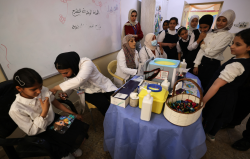Date
28 November 2024
Why clinical trials are rarely conducted in Sub-saharan Africa
Direct links
The article highlights a critical concern raised in the 2024 Index: the inadequate representation of resource-poor populations in clinical trials, with only 43% of studies taking place in LMICs. This lack of inclusion not only exacerbates inequities in access to essential healthcare products but also restricts pharma companies' ability to develop treatments tailored to the needs of these populations. As a result, the chances of ensuring broad access to essential healthcare once new products are introduced to the market are significantly diminished.
“Companies only plan to make their pipeline candidates available in six countries in scope on average (out of a total of 113). This means people in many LMICs will face delays in accessing the latest innovations once they reach the market,” it quotes Jayasree Iyer, the CEO at Access to Medicine Foundation.
The article then explains that limited clinical trials in some African countries are due to poor infrastructure, inadequate facilities, shortage of trained healthcare workers, and complex regulatory processes that create delays. To address these challenges, it encourages pharma companies to collaborate with local partners to build research capacities and conduct trials, particularly for diseases that disproportionately affect these regions.
Claudia Martínez, the Director of Research at the Foundation, is quoted saying: “Companies must prioritise patient reach or risk falling short in addressing health inequity. Our findings lay out a clear path for pharma companies to do this, emphasising how they can embed equitable access within their business operations.”

